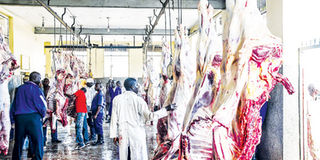Money queries continue to haunt city abattoir

Ready. Butchers prepare meat for sale at the city abattoir on Port Bell, Kampala, in 2015. PHOTO BY ERIC DOMINIC BUKENYA
For eight years now since butchers took over management of the city’s biggest slaughterhouse on Port Bell Road in 2011, wrangles over accountability still rage on.
Under their umbrella body, City Abattoir Traders Development Association (Catda), the butchers took over management after they heavily protested Mr Daniel Kwantampora to whom the facility had been controversially sub-leased by city businessman Hassan Basajjabalaba.
A section of butchers, who spoke to Daily Monitor, alleged that ever since Catda gained possession of the facility, it has never given accountability of the daily dues collected.
Mr Bonny Katumba, one of the butchers, said it would be unfair for government to compensate Mr Basajjabalaba using taxpayers’ money without first inquiring into the revenues which the facility has been generating for the last eight years.
“Catda must show accountability of how much money they have been collecting since they took over management of that public facility for all these years. It is a matter which government must interest itself in because that facility generates a lot of money whose accountability isn’t known. Whenever we speak about it, we are threatened,” he said.
Mr Katumba and his other dissatisfied colleagues also fault Kampala Capital City Authority (KCCA) for ‘abandoning’ a public facility yet it generates a lot of revenue, which would be used for service delivery in the city.
Last year, MPs on the Presidential Affairs Committee recommended that government through KCCA should compensate Mr Basajjabalaba Shs85b for failure to assure him of vacant possession of the facility.
The first instalment of the compensation will be paid to Mr Basajjabalaba in the 2019/2020 financial year budget.
The Catda secretary, Mr Muhammed Nsubuga, yesterday said all the money collected caters for utility bills such as water, electricity, and maintenance of the facility, among others.
Mr Nsubuga dismissed claims that management was using revenue generated from the facility to enrich themselves.
“Maintenance of this [abattoir] is very expensive but people don’t see that. For instance, we spend Shs40m on electricity, Shs30m on water and about Shs20m on garbage collection every month. Therefore, there is no way you can start accusing us of failure to account for the revenues,” he said.
For every cow that is slaughtered from the abattoir, Mr Nsubuga revealed that the owner pays Shs15,000.
He said they slaughter at least 250 cows everyday, which is about Shs3,750,000. This means that every month, the facility generates at least Shs112, 500,000. At least 7,000 butchers work at the facility.
When we asked for monthly documentation from Mr Nsubuga on how they spend the revenue from the facility, he declined.
Mr Katumba implored KCCA to carry out an audit of the facility to ascertain how much revenue is collected.
But Mr Nsubuga said they are ready to surrender the facility to KCCA after resolving their issues with Mr Basajjabalaba.
KCCA could not be reached for a comment. However, Kampala minister Beti Kamya recently told this newspaper that the facility would revert to KCCA after compensating Mr Basajjabalaba.
How management row started
On March 1, 2000, Kampala City Council (KCC), the predecessor of KCCA, gave a one-year contract to Basajjabalaba Hides and Skins Company Ltd (BHS) owned by businessman Hassan Basajjabalaba to manage the abattoir.
According to the contract, a copy of which Daily Monitor has seen, Mr Basajjabalaba was supposed to be remitting a monthly fee of only Shs20m to KCC.
On June 4, 2001, KCC offered a 49-year lease to BHS at a fee of Shs600m. Mr Basajjabalaba was supposed to be remitting a ground rent of Shs2.7m annually, payable by two equal half yearly instalments in advance on the first day of January, and the first day of July in every year.
Mr Basajjabalaba, documents show, was also supposed to redevelop Kampala’s biggest slaughter house into a modern structure, and manage the entire facility on behalf of KCC.
However, KCC later realised that he had sub-leased the same facility to Travellers Coaches Ltd of Mr Daniel Kwatampora Katarihwa in 2008 without their consent.
Mr Kwantampora allegedly increased fares at the facility, something the butchers protested and asked the city authority to kick him out.
When KCC was rebranded into KCCA in 2011, butchers seized the opportunity and petitioned Lord Mayor Erias Lukwago over the controversial giveaway of the slaughterhouse to Mr Kwantampora.
Mr Lukwago, who had pledged to weed out all manipulative forces from the city’s public working spaces during his campaigns, intervened in the wrangle and halted Mr Kwantampora’ s operations in the facility hence court battles ensued.
Although Mr Basajjabalaba repossessed the facility back from Mr Kwantampora in 2011, traders under their umbrella body of City Abattoir Traders Development Association (Catda) rejected him.




